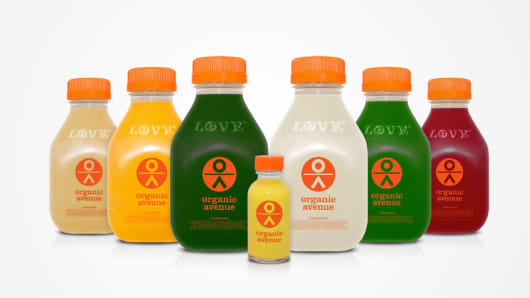Organic Avenue has nine locations in New York City and plans to open three more soon.
"The immediate plans are to continue opening more stores in the New York area, launching a national juice-cleanse business, and then in the coming months we're going to be [devising] our expansion plans beyond New York," Grayer said.
Sam Hamadeh, CEO of PrivCo, said his data show that private equity investment in and control acquisitions of juice and beverage companies began to rise circa 2004 to 2005.
"That's also when fresh juices and healthy beverages began to materially outgrow soft drinks and other less healthy beverages as consumers were switching to healthier eating options in every category," he said. "Public awareness of the unhealthiness of soft drinks began to pick up at the same time."
According to Beverage Digest, soda volume has been declining since 2005, and 2012 marked the lowest soda consumption since 1996. Beverage companies were on the defensive even before then, with both Coca-Cola and PepsiCo broadening their portfolios, including Coke's deal for Odawalla and PepsiCo's acquisition of Naked Juice.
(Read More: Gulp! Soda Consumption Declines to Lowest Level Since 1996)
Juice is the third-most consumed breakfast item, after coffee and cereal, said Harry Balzer, a chief industry analyst at The NPD Group. Though overall juice consumption has been dropping, companies see this giant market as a place for picking off market share, he added. One way companies try to enter the market is by offering something new, Balzer said.
"It's really not about the decline," he said. "It's about the size. … If you're the one to turn this around, you'll be happy, and you'll have a lot of competitors because a lot of people will follow you."
Investments in food and beverage businesses aren't unusual for PE firms, and many spotted the emergence of trends within the juice space earlier than did venture capital funds, whose investments typically demand rapid growth and are more often in tech-related fields. PE firms liked the steady cash flow from these consumer brands and the potential for strategic buyers to scoop up once they had grown.
Hamadeh said that only in the last couple of years has he seen a rise in venture capital firms getting involved in juice.
Juice Goes Mainstream
When Melvin Major Jr. of Melvin's Juice Box and Miss Lily's entered the business 22 years ago, he could count on one hand the number of New York restaurants offering green juice.
"Now you can hardly walk a block without finding an organic juice place or café or restaurant or supermarket or grocery store selling organic juice," Major said. "Dedicated juice bars are popping up all over town, and organic juice is available in many new sorts of places that have not traditionally sold it."
With people becoming more knowledgeable about nutrition, business owners said they've seen more customers getting into the juice habit.
(Read More: Secret Restaurant Menu Items)
"As we've expanded to new neighborhoods, we've seen our demographics expand," said Eric Helmes, Juice Generation's founder. "Today, a juicer is a high school student grabbing a drink before school, a businessperson coming in for a raw lunch, a trainer coming in for a smoothie after a vigorous workout."
Enthusiasm for these newer juices is apparent in the grocery aisle. For the 52 weeks ended April 21, sales of Starbucks-owned Evolution Juice Harvest brands were up 23 percent from the previous year, while Pepsi's Naked Juice sales jumped about 28 percent and Campbell Soup's Bolthouse Farms sales rose 32 percent, according to market research firm IRI.
Juice Generation vows to remain independently owned, but several others have already partnered with investors.
Hain Celestial recently bought BluePrint, which generated about $20 million in sales last year, for an undisclosed sum. Hain's founder and CEO, Irwin Simon, said he plans to create a larger retail presence for the brand and build it into a global business.
After receiving $5 million in private equity funding, Austin, Texas-based Daily Juice has laid out a relatively ambitious goal of having 100 stores by 2016.
(Read More: Best Places to Start a Business)
Science Inc., a start-up incubator known for its role in working with Dollar Shave Club and Wittlebee, has also bet on the space by helping Urban Remedy raise almost $1 million to launch in November.
Juice Press' CEO recently sold stakes of his company to Kenny Dichter, who founded aviation company Marquis Jet before selling it to Berkshire Hathaway, and Yankees first baseman Mark Teixeira, reported Crain's New York Business. Juice Press also raised $7 million in venture capital from investors such as Home Depot's Ken Langone and hedge-fund manager Stan Druckenmiller.
After years of having just one location in New York's East Village, Liquiteria said it plans to add two more stores.
While the juice-investing frenzy may evoke comparisons to a bubble, companies are quick to say they see the trend as here to stay.
"Absolutely no bubble—we have completed an in-depth analysis, and cold-pressed juice is a solid trend, not a fad," said Liquiteria CEO Mark Wood. "The increase in demand over the past eight years is remarkable."
Despite investors' recent gush of enthusiasm for juice, PrivCo's Hamadeh cautioned that VC firms who are putting money into the space later may find the opportunity has already reached its "best-by" date, with many leading PE firms already scoring significant returns.
"With venture capital firms having no traditional sector expertise in juice ... there is a danger of their being late to the market, chasing returns, at high valuations, just as large beverage giants are rolling out copycats," he said.



